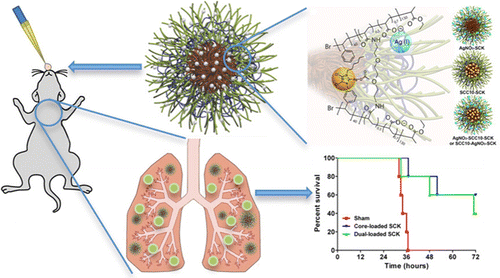Synthesis, characterization, and in vivo efficacy of shell crosslinked nanoparticle formulations carrying silver antimicrobials as aerosolized therapeutics
Parth N. Shah, Lily Y. Lin, Justin A. Smolen, Jasur A. Tagayev, Sean P. Gunsten, Daniel S. Han, Gyu Seong Heo, Yali Li, Fuwu Zhang, Shiyi Zhang, Brian D. Wright, Matthew J. Panzner, Wiley J. Youngs, Steven L. Brody, Karen L. Wooley,* Carolyn L. Cannon*
*shared last authorship
The use of nebulizable, nanoparticle-based antimicrobial delivery systems can improve efficacy and reduce toxicity for treatment of multi-drug-resistant bacteria in the chronically infected lungs of cystic fibrosis patients. Nanoparticle vehicles are particularly useful for applying broad-spectrum silver-based antimicrobials, for instance, to improve the residence time of small-molecule silver carbene complexes (SCCs) within the lung. Therefore, we have synthesized multifunctional, shell cross-linked knedel-like polymeric nanoparticles (SCK NPs) and capitalized on the ability to independently load the shell and core with silver-based antimicrobial agents. We formulated three silver-loaded variants of SCK NPs: shell-loaded with silver cations, core-loaded with SCC10, and combined loading of shell silver cations and core SCC10. All three formulations provided a sustained delivery of silver over the course of at least 2–4 days. The two SCK NP formulations with SCC10 loaded in the core each exhibited excellent antimicrobial activity and efficacy in vivo in a mouse model of Pseudomonas aeruginosapneumonia. SCK NPs with shell silver cation-load only, while efficacious in vitro, failed to demonstrate efficacy in vivo. However, a single dose of core SCC10-loaded SCK NPs (0.74 ± 0.16 mg Ag) provided a 28% survival advantage over sham treatment, and administration of two doses (0.88 mg Ag) improved survival to 60%. In contrast, a total of 14.5 mg of Ag+ delivered over 5 doses at 12 h intervals was necessary to achieve a 60% survival advantage with a free-drug (SCC1) formulation. Thus, SCK NPs show promise for clinical impact by greatly reducing antimicrobial dosage and dosing frequency, which could minimize toxicity and improve patient adherence.
